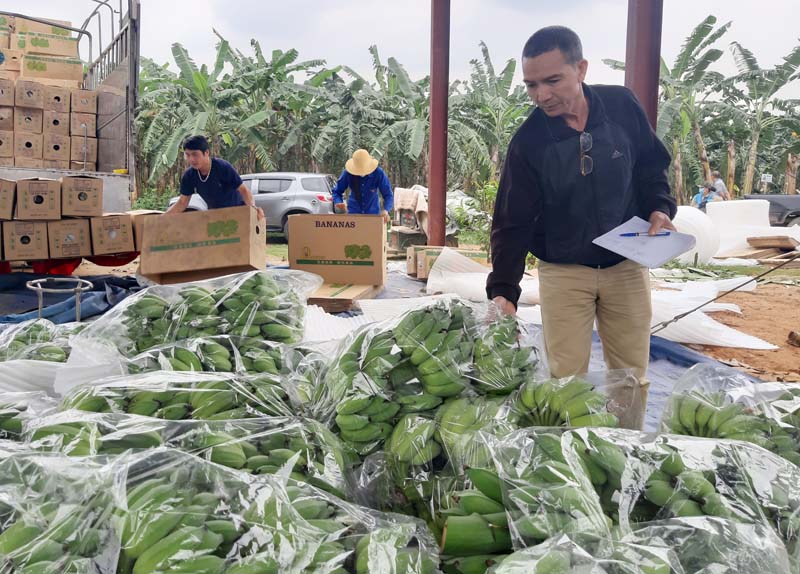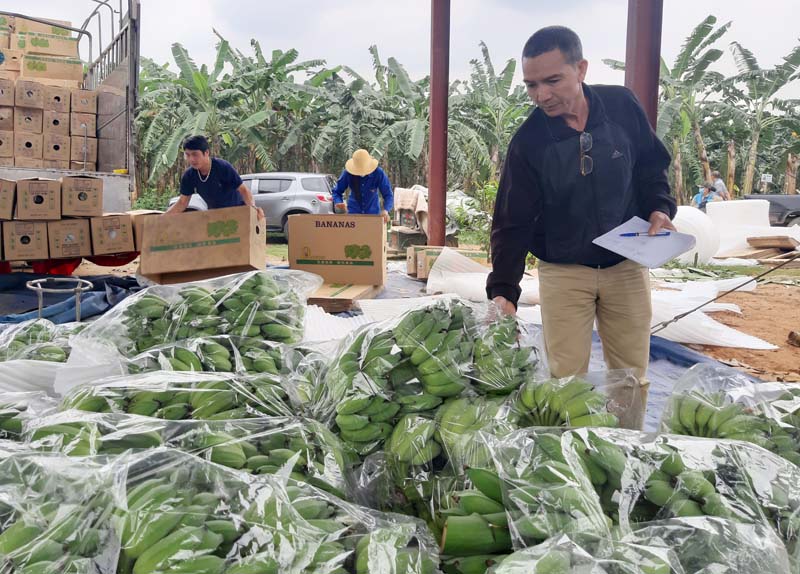
(HBO) - Hoa Binh has a number of agricultural products farmed on commercial scale, such as longan, dragon fruit, banana, winter melon, and pumpkin along with many local specialties including sugarcane, tea, waxy corn, temperature climate fruits, herbs and medicinal plants. Many of these products have been exported.
The province has adopted a plan for the issuance of
Production Unit Code (PUC) for local agricultural products, making it one of the
first provinces in the country to do so.
 Bananas produced by Phu Cuong – Song Da
agricultural cooperative are granted with a Production Unit Code for export to
China.
Bananas produced by Phu Cuong – Song Da
agricultural cooperative are granted with a Production Unit Code for export to
China.
Dr. Nguyen Hong Yen, Director of the provincial
department of cultivation and plant protection, said to be granted a PUC, a
farm must satisfy many requirements. For example, plants must be pure-bred and
cultivated on a large enough area, she said.
Cultivation procedures and disease prevention measures must
be standardized and follow good agricultural practices (GAP), she noted, adding
that it is also important to keep farming records, particularly in terms of how
pesticide is used.
As of October 2020, Vietnam had issued 1,742 PUCs on a
total farming area of nearly 185,200 hectares for farm produce exported to the
Chinese market.
Some other northern provinces have also successfully
issued and managed PUCs for farming areas of longan, lychee, banana,
watermelon, and dragon fruit.
The province has developed policies for expanding export markets
for its key agricultural products from 2020 – 2025, with a vision towards
2030./.
According to data from the Hoa Binh Provincial Party Committee, the industrial production index for the first six months of 2025 is estimated to have increased by 20% compared to the same period last year. This marks the highest year-on-year growth rate for this period since 2020.
In the first six months of 2025, Hoa Binh province’s export turnover was estimated at 1.145 billion USD, marking an 18.11% increase compared to the same period in 2024. Import turnover was estimated at $ 804 million, a 17.15% increase, which helped the province maintain a positive trade balance.
The lives of the ethnic minority farmers in Tan Lac district have gradually improved thanks to the new directions in agricultural production. This is a testament to the collective strength fostered through the professional associations and groups implemented by various levels of the district’s Farmers’ Union.
With the motto the "product quality comes first,” after nearly one year of establishment and operation, Muong village’s Clean Food Agricultural and Commercial Cooperative, located in Cau Hamlet, Hung Son Commune (Kim Boi district), has launched reputable, high-quality agricultural products to the market that are well-received by consumers. The products such as Muong village’s pork sausage, salt-cured chicken, and salt-cured pork hocks have gradually carved out a place in the market and they are on the path to obtaining the OCOP certification.
In the past, the phrase "bumper harvest, rock-bottom prices" was a familiar refrain for Vietnamese farmers engaged in fragmented, small-scale agriculture. But today, a new spirit is emerging across rural areas of Hoa Binh province - one of collaboration, organisation, and collective economic models that provide a stable foundation for production.
Maintaining growing area codes and packing facility codes in accordance with regulations is a mandatory requirement for agricultural products to be eligible for export. Recently, the Department of Agriculture and Environment of Hoa Binh province has intensified technical supervision of designated farming areas and packing facilities to safeguard the "green passport" that enables its products to access international markets.



 Bananas produced by Phu Cuong – Song Da
agricultural cooperative are granted with a Production Unit Code for export to
China.
Bananas produced by Phu Cuong – Song Da
agricultural cooperative are granted with a Production Unit Code for export to
China.